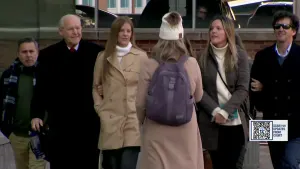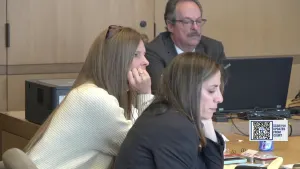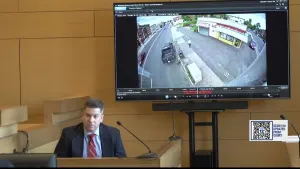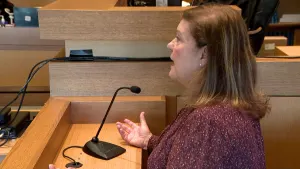More Stories
Attorneys in the Michelle Troconis case wrapped up arguments Tuesday in Stamford Superior Court on a motion from the defense to suppress all evidence seized at the Farmington home Troconis shared with Fotis Dulos when his estranged wife disappeared.
The motion claims the search of 4 Jefferson Crossing wasn’t legally executed by police so anything seized should be excluded from Troconis’ upcoming trial. She’s pleaded not guilty to charges, including conspiracy to commit murder, evidence tampering, hindering prosecution and conspiracy to commit evidence tampering in the presumed death of Jennifer Dulos.
“What we're dealing with was an unreasonable execution of a warrant,” Attorney Jon Schoenhorn, who represents Troconis, stated in his final remarks to Judge Kevin Randolph.
“The police conduct in this case was absolutely reasonable and appropriate,” countered Assistant State’s Attorney Sean McGuinness.
Police arrived at the Farmington home with a warrant on May 31, 2019—one week after Jennifer Dulos was last seen. Schoenhorn said law enforcement ordered everyone out of the house and held the scene for four days with the search not happening until June 3. He told the court he hasn’t found any case where a search took that long or where people were told they had to leave.
“To eject them from a home and say, ‘Well, we're going to be here for days. You have to move someplace else,’ is, I think, not only unreasonable but outrageous,” Schoenhorn said. “Because of the length of time, anything that was seized then on June 3 was unreasonable, and therefore, the remedy under the Connecticut constitution should be suppression.”
The state argued that the Jennifer Dulos investigation was very fluid at the time, and though the house was secured on May 31, police ended up executing other warrants before this one.
“There is no causal connection at all between the length of time that the home was seized and the discovery of this evidence. It's not as if they entered some part of the home they weren't supposed to enter and they discovered the evidence that way,” McGuinness told the court.
Schoenhorn also argued that the search was “a rummaging” of the house, and all items seized except one, black trash bags, went beyond the scope of the warrant. That includes what police termed “alibi scripts,” handwritten timelines of where Troconis and Fotis Dulos allegedly were the day Jennifer Dulos went missing. Schoenhorn said the search warrant was very specific about what type of handwritten notes could be taken.
“If it's simply handwritten notes, they could seize them, but it says, ‘Handwritten notes or correspondence by, to or from the victim.’ It's not that,” Schoenhorn stated.
McGuinness disagreed and pointed to Jennifer Dulos’ name being written on one of them and said the notes involved Troconis and Fotis Dulos, who were suspects in the investigation. He also said even if the judge sides with the defense on that point, police were still allowed to seize the timelines because they were in plain view and clearly relevant to the investigation.
“When they examined the document, the probable cause to believe it was related to the case was immediately inherent due to the fact the document set forth a detailed timeline for the date that Jennifer Dulos went missing,” McGuinness said.
The judge has heard testimony on the search since mid-August with witnesses including law enforcement, Fotis Dulos’ former attorneys and Michelle Troconis’ mother. Randolph previously denied another motion to suppress evidence from the search based on an argument the warrant was overly broad and lacked probable cause. He still hasn’t ruled on whether police had the legal right to obtain all the electronic devices they took.
Schoenhorn mentioned that in court, saying the crime that was alleged in the search warrant at the time was assault.
“Unless the state argued that some kind of electronic device was used to beat Jennifer Dulos or anyone else over the head, there is zero connection, other than, as we heard, ‘Oh, we would like to get that. There are all sorts of things in people's homes and computers,’” Schoenhorn argued.
McGuinness disagreed but said if the judge decided there weren’t grounds to search all the electronic devices, “the remedy would be to sever the warrant with respect to electronics,” rather than throw everything out.
Schoenhorn also argued that police took pictures of documents that weren’t included in the warrant’s list, including passports, receipts, and a bill from a law firm. He said even though those items weren’t physically seized, taking a picture is still a seizure. McGuinness said if the judge ruled specific seized items weren’t covered by the warrant, just those items should be suppressed rather than deeming all the evidence from the search inadmissible at trial.
Randolph said he expects to issue a written ruling on this motion by Oct. 3. That’s the day before jury selection begins in the case, which is expected to take at least a month. The trial isn’t set to start until January because there are several outstanding motions regarding evidence suppression that still have to be argued.
Troconis is the first defendant in the Jennifer Dulos investigation to go to trial. Fotis Dulos died by suicide in January 2020 while facing charges including murder and kidnapping. His friend and former attorney, Kent Mawhinney, is also charged with conspiracy to commit murder and has pleaded not guilty.
More from News 12
8:49

Michelle Troconis sentenced to 14 1/2 years in Jennifer Dulos case
3:08

Next steps: Law experts discuss Michelle Troconis sentencing, chances for a successful appeal
4:25

Innocent girlfriend or murderous conspirator? Jury opens deliberations in missing mom case
1:03

Troconis trial: Michelle Troconis trial resumes on Tuesday
2:36

Prosecutors show footage of Fotis Dulos’ spree of trash bin visits during Day 7 of Troconis trial
3:01
